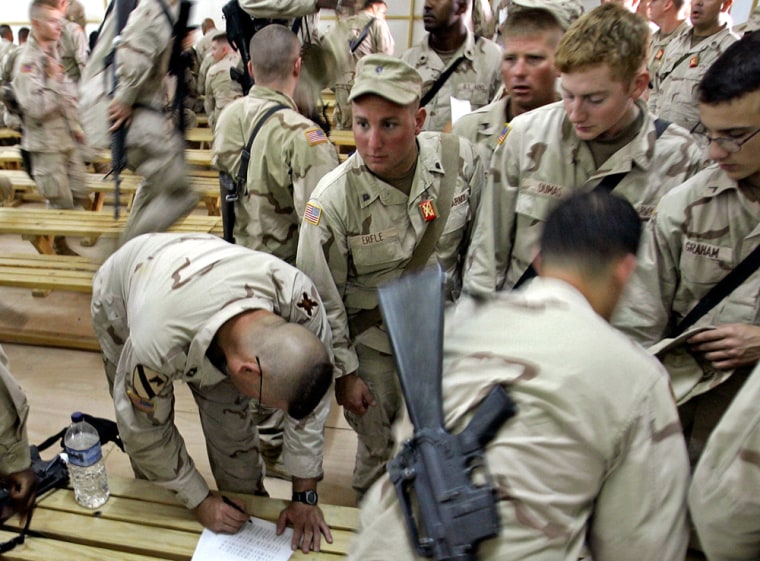Hundreds of soldiers from a New Orleans National Guard unit begin leaving Thursday to return to the devastation left by Hurricane Katrina. Guard officials said 80 percent lost homes or jobs and some had not heard from relatives since the storm.
A Pentagon team led by Brig. Gen. Sean Byrne flew into this U.S. base in the Kuwaiti desert to help ease the Louisiana’s unit redeployment home.
Speaking Wednesday to 150 soldiers sitting on plywood benches in a tent billowing in the wind, Byrne told them that if their homes are gone and their families scattered and homeless, the Army will help.
“The focus isn’t necessarily on the Army right now. The focus is on you and your family,” said Byrne, director of military personnel management.
In the audience, Sgt. John Roger, 30, said his wife and two children survived the storm by fleeing to Kansas in his pickup truck to stay with his in-laws. A neighbor stranded on her roof told the family she watched flood waters carry off its three-bedroom, cypress-wood house.
‘She saw my house float past her’
“She saw my house float past her. She took a picture of it,” Roger said in a Cajun drawl. “They said the water came in so fast down there, it swept everything away. I lost everything I own, except my truck.”
The house once sat between a pair of moss-draped oaks in lower St. Bernard Parish, outside New Orleans. Asked where his house was now, Roger said: “I don’t know. Probably in the gulf somewhere.”
Soldiers like Roger — who survived 10 roadside explosions and had a friend killed by a suicide bomber — were already stressed from a year of combat west of Baghdad. Now they face a different kind of trauma: families made homeless, communities devastated.
Over the next two weeks, the 3,700 soldiers of the Louisiana Guard’s 256th Brigade Combat Team will be flown to a former military airport in Alexandria, La., and then travel to nearby Fort Polk.
Of the U.S. troops in Iraq and Afghanistan, the 256th was hit hardest by Katrina, particularly Roger’s New Orleans-based unit, the 1st Battalion, 141st Field Artillery Regiment.
545 soldiers ‘drastically’ affected
The brigade has 545 soldiers “drastically” affected by the disaster, and almost 300 of those are in the artillery battalion, said Lt. Col. Debbie Haston-Hilger, U.S. military spokeswoman in Kuwait.
Fifty battalion soldiers still hadn’t been able to contact some relatives as of Monday, Haston-Hilger said. Some family members are thought to have perished.
The Mississippi National Guard’s 155th Brigade Combat Team, based in western Iraq, had 300 soldiers affected by the disaster, Haston-Hilger said. The 155th isn’t scheduled to finish its tour until January.
The Pentagon has sent a team led by a two-star general to Fort Polk to prepare for the arrival of the 256th, helping with requests for relief, insurance settlements, mental health counseling and housing.
“They’re waiting to go home and they’re facing a whole lot of uncertainty,” Byrne said. “We’re here to try to mitigate that uncertainty.”
Byrne and his Pentagon comrades laid out options for the Louisianans, recommending that rather than return quickly to a disrupted civilian life, they remain on active duty at Fort Polk and bring their families there to stay. Byrne said the soldiers could also enlist in the regular Army.
“If you go back to Louisiana or Mississippi and your house is gone, it gives you another option,” he said.
Roger, a welder, said he would go to Kansas, where his wife has enrolled their children in school. But he said he prefers bayou life and will go back eventually.
“You got so many ties down there, so many friends,” he said. “It’s a way of life. It’s hard to say to hell with it.”
